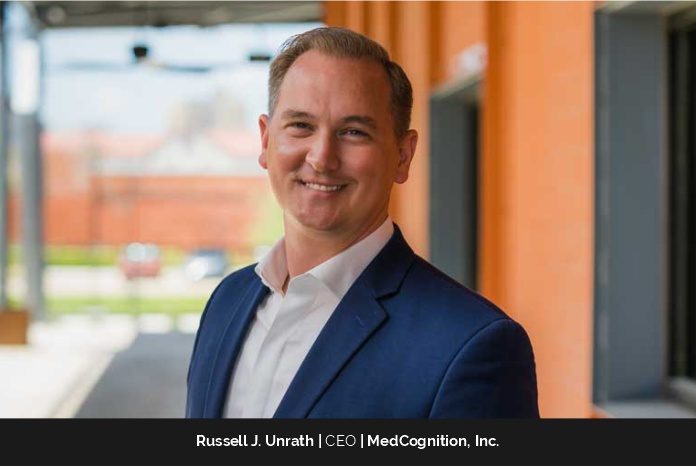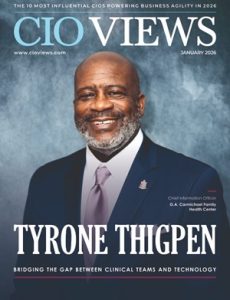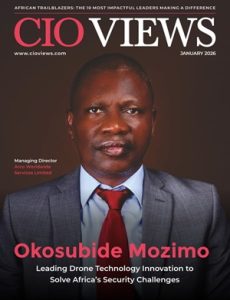Medical error is the third leading cause of patient death, and in 1997, at the tender age of 13, Russell J. Unrath’s young life was abruptly, and tragically, impacted by that statistic, when his mother passed away from a series of complications that could have, and should have, been prevented.
For Russell, his personal tragedy became the driving force to become part of a Health Care Organization that that was willing to take risks, be on the cutting edge of technology, and disrupt the future of medical simulation in a positive way.
The crucial importance of medical simulation in training medical professionals
Russell started his career at Genzyme Genetics, a pharmaceutical company involved in cancer research, where he watched researchers and developers create products, sparking his interest in lifelong learning.
His journey to health care was not a straight path, and before he joined MedCognition, his biggest achievement was helping create efficiencies in a hospital system network, where he managed to help the hospital go from the verge of bankruptcy to thriving expansion.
As the CEO of MedCognition, Inc., his aim is to create change in healthcare by lowering the barriers of access to medical simulation through leveraging cutting-edge technology. Medical simulation is a highly valuable tool for preparing healthcare professionals and first responders in dealing with low frequency, high stakes life-threatening medical conditions.
Realism, cost, and portability are the three most common barriers to greater use of simulation, and MedCognition’s aim is to transform medical simulation training by creating an intuitive clinical experience.
MedCognition’s PerSim® holographic patient simulation system is the brainchild of a physician and 101st Airborne surgeon, Kevin King, a brigade surgeon in the field in Iraq, who had to use plastic mannequins that were not training his students the right way.
PerSim® was created by leveraging the experience of seasoned clinicians, educators, and computer scientists. “I absolutely believe that MedCognition’s training product, PerSim®, will shape the future of out-of-hospital professionals,” states Russell.
Since the COVID crisis, the use of medical simulation has grown as a tool to help bridge the gap in workforce preparedness, and Augmented Reality will be key to solving the problem of medical training.
“The more immersive we can become, the more engaged in an augmented world, where it’s safe to train, yet safe but hurts to fail, is the way we’ve been able to use this disruptive technology,” says Russell. “There are a lot of organizations that offer virtual reality, which is very static. So we’re looking at advancement, and augmented reality is still cutting edge.”
PerSim® allows medical professionals the experience of seeing a sim patient experiencing real-world problems and pain in real-time, by simulating these clinical states as they happen and change dynamically.
Delivering dynamic realism in medical simulation with an immersive experience
Russell confirms that the risk of stepping into a disruptive industry like medical simulation training is definitely a balancing act, because MedCognition is fighting battles on several fronts, when it comes to traditional simulation training.
He admits that the risk and the challenge is really about how to position PerSim® to be seen as a standard and common training practice.
“MedCognition is butting up against larger organizations that have been in the simulation industry for decades, and everyone knows who they are. So our big risk is, nobody really knows who we are, despite having 72 customers across the U.S., and doubling our customer base in 2021,” notes Russell. “We’re just the underdog at this point, and we’d like to flip the script in that story.”
Russell points out that MedCognition’s product truly creates decision-makers, and that when medical practitioners see a product that can help them train in an immersive environment, that allows their mind to understand the logistics and mechanics of what’s happening, and helps them become decision-makers, not box checkers, they get really excited about it.
He explains that while a plastic mannequin is not going to show you what a sick patient looks like, an augmented reality hologram absolutely shows you what a sick patient looks like, and it allows for that cognitive pathway to be opened up to see, for example, that a patient is having a respiratory issue.
“Now the instructor and the student can go on these Choose Your Own Adventure multiple paths to determine the best course of treatment, and that again, creates a decision-maker, not a box checker, and that’s really been disrupting the industry so much that the instructors who see our tool say, ‘Wow, PerSim® creates the ability to be immersed in a scenario!,” explains Russell.
While MedCognition’s target customers are hospital professionals, they’re also seeing a great wake of enthusiasm from community colleges with paramedical and nursing programs, and Municipal EMS organizations that see the value of immersive training.
“We have the ability to manipulate the system based on the complexity of the educator involved, building the scenarios to make this apply for in-hospital professionals,” notes Russell.
For medical schools, MedCognition is developing remote instructor capabilities. They also have projects with the government, and hope to go from 75 to over 500 customers, and build Global Partnerships, in the next two to five years.
Russell firmly believes that in the near future, MedCognition will be the standard in frontline medical training. “You can absolutely mark my words on that as well. We’re going to completely disrupt mannequin simulation,” he affirms.
Eclipsing the competition with a grassroots approach to outreach
Russell points out that MedCognition is slowly starting to eclipse their competition, with a grassroots approach to reaching out to customers. They’ve given all their customers an opportunity to receive education and external grants, to provide them better access to simulation training.
They also ran a series of trade shows, webinars, and courses in San Antonio, where they provide deep dive training to help their customers understand the benefits of simulation, versus the traditional methods they’re used to.
Russell explains that, in order to reduce that sunken cost bias, they need people to reach out and touch and play with their product. So they provide free trainings, such as demo-in-a-box software, and ship units out to customers who are very used to plastic mannequins.
“Our product can be used in tandem with high-fidelity mannequins, and extend the capital or operating expense budget of small EMS institution, or a large one for that matter,” says Russell, explaining that they offer to create a high-fidelity mannequin for their customers, that will save them money over time, even while spending money with their system.
He notes that when medical professionals see a patient is really struggling, and then get that hologram, and see them go from a position of struggle, to a position of recovery, it helps them overcome some of the competition, and disrupt the industry as well.
“What really motivates us is providing an experience that our educators and students can’t get anywhere else aside from a sim, and we do share that common vision and common goal,” says Russell.
Adapting to an evolving vision of leadership
Russell explains that in the early stages of his career, he believed that leadership was about always having a confident answer, telling people what they needed to know, what they needed to do, and when and how to do it.
However, of late, it has become a collaborative engagement of finding ways to support his employees, and asking questions like: What else can I help you with? How can we get you educated? What tools can I provide for you? What can I learn as a leader, so that I’m enabling and empowering my team to produce the best possible work?
“So it’s definitely evolved over the years, especially since joining MedCognition. We’ve shifted our culture to make sure that our employees have the appropriate work-life balance, and that their mental health is well cared for,” notes Russell.
He explains that they have programs that help them produce good work, and interact and engage with their customers, who absolutely need advocates and cheerleaders and friends, not just a company that’s providing a service for them.
“When I joined as CEO, I knew that the company needed a fresh perspective, not from a medical perspective, but a business executive who could look strategically, and say, here are the things we need to change, and here’s the order we should change them in. Now almost two years later, we’re functioning as a well-oiled machine,” he observes.
Russell admits that employee mental health and wellness has always been very personal for him, as he believes that having an appropriate personal life balance creates a good working individual. As a result, the company implemented more flexible policies during the pandemic, but kept the static work location.
Under his leadership, MedCognition also implemented 401K investment programs, wellness programs, and tools for the team to reach out to mental health and wellness counselors, and stay connected in a remote environment.
“I think our team talks more now, when we’re in scattered across five different states, than we did when our team was based in San Antonio,” notes Russell.
He points out that they have a very light atmosphere which is hard to maintain with remote employees. They do weekly events over Zoom or Teams that keep the team motivated by allowing them to feel like they’re all in this shared journey, and that, at the end of the day, work is not everything.
Russell points out that leadership is simply about being willing to learn on a daily basis, and that his goal is about what new information he can learn each day that will benefit his employees and customers, and as a byproduct, benefit him as well.
For him, success is building up the individuals in his immediate circles, creating sincere connections with those around him, and enabling others to succeed.
Russell believes that taking an organization like MedCognition from where it is to where he wants it to be, requires sacrifice, and he considers himself fortunate to have a wife who understands his driving passion, and supports him unwaveringly.
“Without her, I would not be in the position I’m in. I think our organization wouldn’t even be in the position we’re in right now, because I have a pillar of support, who also works full-time, by the way, but takes the burden with our ten year old twins, and our two year old Golden Retriever, so that I can pour myself into my work, to be the best for my employees, customers, board of directors, and create new road maps, new visions, a new subset of products, new line of questioning, so that we can truly continue to learn each day,” he concludes.





